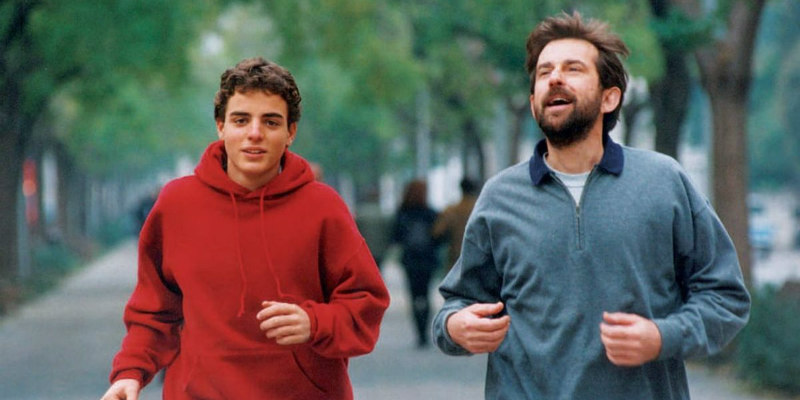
Review by
Eric Hillis
Directed by: Nanni Moretti
Starring: Nanni Moretti, Laura Morante, Jasmine Trinca, Giuseppe Sanfelice, Sofia Vigliar

It's difficult to portray grief in cinematic terms. What even is grief? How
we grieve as individuals is shaped by our cultural backgrounds, our life
experiences, our relationship to the deceased. There's no right or wrong way
to grieve, despite what blowhards on the internet might tell you when a
celebrity "remarries too soon" after losing a spouse or when a stand-up
comic works their loss into a witty routine. Some of us fall into a funk for
weeks, months, maybe even years. Others take a deep breath and move on,
immersing ourselves in whatever distractions we can cling to. When we
grieve, are we mourning the deceased? Or is it something more narcissistic,
a sadness for the empty space they've left in our own life? We're all just
coping, and grief isn't for anyone else to police.
In his 2001 Palme d'Or winning masterwork, The Son's Room, Nanni Moretti refuses to police the grief experienced by his
protagonists, a middle class Italian family whose teenage son, Andrea (Giuseppe Sanfelice), dies in a diving accident.

Andrea's father, psychiatrist Giovanni (Moretti), returns to work almost
immediately, hoping that by listening to others' problems, he can forget his
own torment. It doesn't happen that way. Giovanni grows contemptuous of his
clients. Their concerns, which he once devoted himself to healing, now feel
petty compared to his own heartbreak. He has a particularly troubling
relationship with one patient, Oscar (Silvio Orlando), with whom he
spent the Sunday morning he unknowingly lost his son. Oscar reveals a Cancer
diagnosis, but Giovanni has little sympathy. At one point Giovanni breaks
down in tears while listening to a patient's mundane worries about her
household routine.
Blaming himself for Andrea's death, Giovanni runs the events of what began
as a perfectly normal Sunday through his head. He imagines refusing to visit
Oscar, and insisting Andrea go for ice cream with him instead of taking that
fatal diving trip with his friends. Desperate for some connection with his
son, he visits the boy's favourite haunts - a fairground where the
adrenaline of a stomach-churning ride momentarily overtakes his grief; the
training pitch where the boy practised various sports; and a record store
where he queries the clerk on what might be a suitable CD to buy as a gift
for Andrea (Brian Eno's 'By This River' seems an unlikely choice for a
teenage boy in 2001, but it makes for an affecting closing credits
accompaniment).
Andrea's mother, Paola (Laura Morante), similarly wishes to
reconnect with her boy. She's gifted the opportunity by the arrival of a
letter from Arianna (Sylvia Vigliar), a teenage girl Andrea met while
away at summer camp. Paola is desperate to meet Arianna, likely imagining
her as the daughter-in-law she might have had. In the emotionally
overwhelming final act, Arianna's presence helps Giovanni and Paola, and
their teenage daughter, Irene (Jasmine Trinca), to come together and
perhaps move forward through an act of selflessness.

It's through a collage of scenes, many of them prosaic, that Moretti
portrays the suffering Giovanni, Paola and Irene are enduring. It's
masterful visual storytelling, with none of his characters ever having to
tell us how they feel; rather Moretti's protagonists dance around their
grief with passive aggressive arguments over petty matters like the state of
their kitchen appliances or in Irene's case, a physical confrontation during
a basketball game. If they lived in the countryside you imagine they might
retreat to an empty field and scream to the heavens, but they reside in an
urban area that rarely affords solitude, hence Giovanni's getting up at the
crack of dawn to run by the city's dockyards.
In one beautifully ambiguous moment, Giovanni clutches his wife's arm when
she begins to speak about Andrea to friends over dinner. Is Giovanni's
gesture meant to show support for Paola or to silence her? It's never made
clear, and this willingness to allow Giovanni to be a flawed figure is a
large part of the film's strength. While we sympathise with what he's going
through, Giovanni doesn't seem like the sort of person we'd want to be
around, unlike the warm Paola, who is more honest in her emotions and less
self-centred. At the same time, many of us will likely identify with
Giovanni's response over Paola's. And that's fine.

Working with cinematographer Giuseppe Lanci, Moretti insists on
a naturalistic look for his film, which adds to the realism, to the honest
mundanity of the spaces we say goodbye in. The film's protagonists are often
pictured surrounded by people, the world carrying on around them even while
they're trapped in stasis. In the psychiatry scenes, Moretti's camera
and Esmeralda Calabria's editing are more egalitarian than
Giovanni, devoting equal time to the tortured shrink and his patients, whose
concerns haven't dissipated even if they've grown smaller in his mind.
I've always considered it a mark of a great movie, and of great filmmaking,
if you feel like the characters are living beyond the frame, going on with
their lives when the camera has panned away to capture something else. In my
mind, Giovanni, Paola and Irene are still out there - maybe things haven't
entirely worked out for them, maybe Giovanni and Paola got divorced because
they reminded one another too much of Andrea, or maybe that's what has kept
them together. Like those I've lost in real life, I think about them every
once in a while, and while I know Giovanni, Paola and Irene won't return,
for 100 minutes or so they were alive, and I'm glad I got to spend it with
them.

